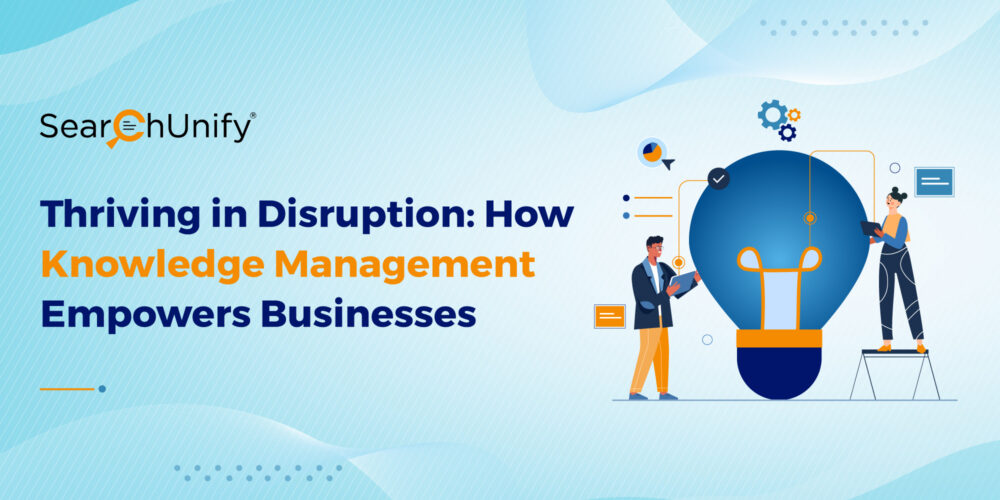
The business world is no stranger to change. But in recent years, the pace of that change has become truly disruptive. New technologies emerge seemingly overnight, customer expectations shift on a dime, and a single innovative player can reshape entire industries. Traditional models struggle to keep up, leaving businesses scrambling for a foothold.
This is where knowledge management (KM) steps in as a critical tool for survival and success. KM goes beyond simply storing information—it’s about capturing, sharing, and leveraging the collective intelligence of your organization.
By fostering a culture of knowledge exchange and collaboration, businesses can unlock the full potential of their workforce and achieve a level of agility that allows them to thrive, even amidst disruption.
AI-Powered Knowledge Management: The Key to Unlocking Your Organizational Success?
Disruptive markets reward agility and innovation, two areas where a robust KM strategy shines. Here’s how KM empowers organizations:
-
Knowledge Sharing and Collaboration
KM breaks down silos and fosters open communication. When employees can easily share expertise across departments, the organization can respond more effectively to changing market conditions.
All you need is a technology that integrates your fragmented silos and provides you with a 360-degree view of enterprise knowledge for brainstorming solutions and tackling challenges together.
-
Capturing and Retaining Tacit Knowledge
Disruption can lead to employee turnover, which can take valuable knowledge with it. LLM-powered products like Knowbler ensure that critical knowledge doesn’t walk out the door. Powered by advanced ML algorithms, GenAI, and Large Language Models (LLMs), it helps your enterprise capture, structure, find, reuse, improve, and optimize knowledge within the workflows, right where your teams operate.
Result?
A significant improvement in agent productivity, customer support, and self-service experience!

-
Faster Decision-Making
No one person has all the answers. KM facilitates access to the collective wisdom of the organization, allowing leaders to make informed decisions based on diverse perspectives and experiences.
This speeds up decision-making, which is crucial in a fast-paced, disruptive market.
-
Innovation Through Cross-Pollination
KM encourages exchanging ideas across departments and disciplines.
By exposing employees to different perspectives, KM fosters a culture of innovation and helps generate new solutions and approaches to tackle disruptive challenges.
The Power of C-Level KM Advocacy
When C-level executives champion a KM strategy, the benefits ripple throughout the organization:
-
Increased Agility
By facilitating knowledge sharing, KM helps organizations react swiftly to changing market dynamics. Employees are empowered to make informed decisions closer to the action.
-
Improved Innovation
A knowledge-sharing culture breeds creativity. When employees can easily access and share information, they’re better equipped to generate new ideas and develop innovative solutions to disruptive challenges.
-
Enhanced Employee Engagement
When employees feel their knowledge is valued, their engagement increases. KM programs that incentivize knowledge sharing foster a sense of community and collaboration, leading to a more engaged and productive workforce.
-
Better Informed Decision-Making
C-level executives with access to the collective intelligence of the organization can make more strategic decisions. KM provides leaders with a clear picture of the market landscape, employee expertise, and potential solutions, leading to well-informed choices for navigating disruption.
According to Gartner, 40% of existing knowledge management systems will fall short of strategic and operational benchmarks by 2027. Why? Because, they lack the AI and ML capabilities required to surface information and consolidate it into a single, unified knowledge source.
-
Fostering Continuous Learning
In a disruptive market, continuous learning is essential. KM programs that encourage knowledge sharing and readily accessible resources equip employees with the skills and knowledge they need to adapt to change and embrace new opportunities.
Knowledge is Power, But Only When Utilized Effectively
In today’s knowledge-driven economy, organizations that leverage their collective intelligence hold the power to thrive. Knowledge management isn’t just about storing information; it’s about fostering a culture of collaboration and continuous learning. By breaking down silos and empowering employees to share their expertise, businesses can unlock innovation, agility, and a competitive edge in a disruptive world.
Want to enable agile knowledge management? Then read this blog to understand why & how to inculcate it in your organization.











